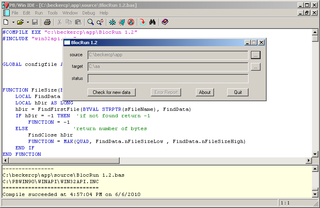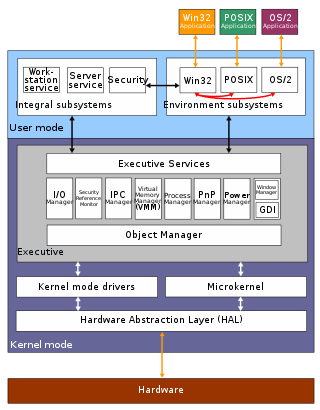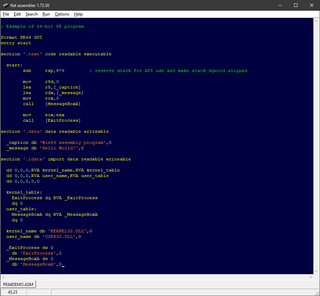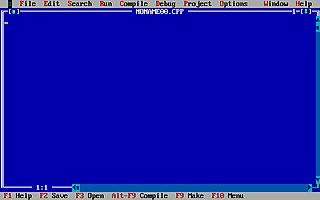Related Research Articles
Turbo Pascal is a software development system that includes a compiler and an integrated development environment (IDE) for the Pascal programming language running on CP/M, CP/M-86, and DOS. It was originally developed by Anders Hejlsberg at Borland, and was notable for its extremely fast compilation. Turbo Pascal, and the later but similar Turbo C, made Borland a leader in PC-based development.

The Netwide Assembler (NASM) is an assembler and disassembler for the Intel x86 architecture. It can be used to write 16-bit, 32-bit (IA-32) and 64-bit (x86-64) programs. It is considered one of the most popular assemblers for Linux and x86 chips.

PowerBASIC, formerly Turbo Basic, is the brand of several commercial compilers by PowerBASIC Inc. that compile a dialect of the BASIC programming language. There are both MS-DOS and Windows versions, and two kinds of the latter: Console and Windows. The MS-DOS version has a syntax similar to that of QBasic and QuickBASIC. The Windows versions use a BASIC syntax expanded to include many Windows functions, and the statements can be combined with calls to the Windows API.
A terminate-and-stay-resident program is a computer program running under DOS that uses a system call to return control to DOS as though it has finished, but remains in computer memory so it can be reactivated later. This technique partially overcame DOS's limitation of executing only one program, or task, at a time. TSRs are used only in DOS, not in Windows.

The Windows API, informally WinAPI, is Microsoft's core set of application programming interfaces (APIs) available in the Microsoft Windows operating systems. The name Windows API collectively refers to several different platform implementations that are often referred to by their own names. Almost all Windows programs interact with the Windows API. On the Windows NT line of operating systems, a small number use the Native API.

FASM is an assembler for x86 processors. It supports Intel-style assembly language on the IA-32 and x86-64 computer architectures. It claims high speed, size optimizations, operating system (OS) portability, and macro abilities. It is a low-level assembler and intentionally uses very few command-line options. It is free and open-source software.
x86 assembly language is the name for the family of assembly languages which provide some level of backward compatibility with CPUs back to the Intel 8008 microprocessor, which was launched in April 1972. It is used to produce object code for the x86 class of processors.
Object Pascal is an extension to the programming language Pascal that provides object-oriented programming (OOP) features such as classes and methods.
High Level Assembly (HLA) is a language developed by Randall Hyde that allows the use of higher-level language constructs to aid both beginners and advanced assembly developers. It fully supports advanced data types and object-oriented programming. It uses a syntax loosely based on several high-level programming languages (HLLs), such as Pascal, Ada, Modula-2, and C++, to allow the creation of readable assembly language programs, and to allow HLL programmers to learn HLA as fast as possible.
The Program Segment Prefix (PSP) is a data structure used in DOS systems to store the state of a program. It resembles the Zero Page in the CP/M operating system. The PSP has the following structure:
The Microsoft Macro Assembler (MASM) is an x86 assembler that uses the Intel syntax for MS-DOS and Microsoft Windows. Beginning with MASM 8.0, there are two versions of the assembler: One for 16-bit & 32-bit assembly sources, and another (ML64) for 64-bit sources only.
INT 13h is shorthand for BIOS interrupt call 13hex, the 20th interrupt vector in an x86-based computer system. The BIOS typically sets up a real mode interrupt handler at this vector that provides sector-based hard disk and floppy disk read and write services using cylinder-head-sector (CHS) addressing. Modern PC BIOSes also include INT 13h extension functions, originated by IBM and Microsoft in 1992, that provide those same disk access services using 64-bit LBA addressing; with minor additions, these were quasi-standardized by Phoenix Technologies and others as the EDD BIOS extensions.
In computing, the x86 memory models are a set of six different memory models of the x86 CPU operating in real mode which control how the segment registers are used and the default size of pointers.
The DOS MZ executable format is the executable file format used for .EXE files in DOS.

Turbo C++ is a discontinued C++ compiler and integrated development environment originally from Borland. It was designed as a home and hobbyist counterpart for Borland C++. As the developer focused more on professional programming tools, later Turbo C++ products were made as scaled down versions of its professional compilers.
On many computer operating systems, a computer process terminates its execution by making an exit system call. More generally, an exit in a multithreading environment means that a thread of execution has stopped running. For resource management, the operating system reclaims resources that were used by the process. The process is said to be a dead process after it terminates.
This article describes the calling conventions used when programming x86 architecture microprocessors.

The Borland Graphics Interface, also known as BGI, was a graphics library bundled with several Borland compilers for the DOS operating systems since 1987. BGI was also used to provide graphics for many other Borland products including the Quattro Pro spreadsheet.
Turbo Debugger (TD) is a machine-level debugger for DOS executables, intended mainly for debugging Borland Turbo Pascal, and later Turbo C programs, sold by Borland. It is a full-screen debugger displaying both Turbo Pascal or Turbo C source and corresponding assembly-language instructions, with powerful capabilities for setting breakpoints, watching the execution of instructions, monitoring machine registers, etc. Turbo Debugger can be used for programs not generated by Borland compilers, but without showing source statements; it is by no means the only debugger available for non-Borland executables, and not a significant general-purpose debugger.
Open Watcom Assembler or WASM is an x86 assembler produced by Watcom, based on the Watcom Assembler found in Watcom C/C++ compiler and Watcom FORTRAN 77. Further development is being done on the 32- and 64-bit JWASM project, which more closely matches the syntax of Microsoft's assembler.
References
- Notes
- Swan, Tom (1989). Mastering Turbo Assembler. Carmel, Indiana: Howard W. Sams & Company, Hayden Books division of Macmillan Computer Publishing. ISBN 0-672-48435-8. 2nd Edition, 1995 ISBN 0-672-30526-7.